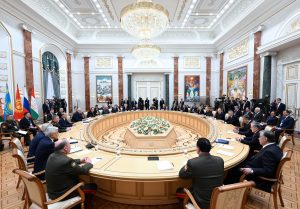More than a week after meeting for a summit in Minsk, the capital of Belarus, the Collective Security Treaty Organization (CSTO) produced a statement from the foreign ministers and a declaration from the Collective Security Council. The delay is rooted in the absence of member-state Armenia from the summit, which gathered the presidents, foreign ministers and other officials from Belarus, Kyrgyzstan, Kazakhstan, Tajikistan, and Russia.
Dated November 22 and published December 5, the statement by the foreign ministers laments the “increasing role of force in international relations and the expansion of the conflict space” and without an apparent sense of the irony states: “We are convinced that the destinies of the peoples of all countries are interconnected; no state should ensure its security at the expense of the security of other states.”
Russia, the largest economy and military power in the CSTO, is presently at war in Ukraine. A war that Russia started.
The statement goes on express concern about the “crisis of the European security system” and appeal to all countries to adhere to the principle of “indivisibility of security.”
The phrase is a Cold War relic clung to particularly firmly by Russia, which has used it to frame its invasion of Ukraine as necessary. As The Guardian explained in February 2022, “At its most crude, it means security should be seen as a collective concept so if the actions of one state threaten the security of another, the principle of indivisible security is breached. Therefore no state should strengthen its security at the expense of another.” In Russia’s view, the deepening Ukrainian relationship with the NATO bloc was Kyiv effectively strengthening its security at the expense of Russia’s. It is essentially an impossible ask; security dilemmas all the way down. Under this logic, no state would be able to invest in its security without risking invasion by a neurotic neighbor.
The CSTO declaration (also published December 5, but dated November 23) repeats the language about “indivisible security” but includes a number of other interesting statements, such as a reaffirmation of a commitment “to refrain from using force or the threat of force in interstate relations and to resolve all disagreements between ourselves and other states through peaceful means.”
Setting Russia’s military adventurism aside, CSTO member states Kyrgyzstan and Tajikistan last year faced off along their contested border. The situation has settled down, with some small progress in negotiations recently announced. But there remains the very real possibility of another flare-up of conflict. Both sides have been busy acquiring new stocks of drones, among other military advancements.
Elsewhere, in September former CSTO member Azerbaijan saw through an end to the long-running “frozen conflict” over the breakaway region of Nagorno-Karabakh — setting off a mass exodus of ethnic Armenians from the region and deepening Yerevan’s frustrations with Moscow. While Armenia says it has no intention of leaving the CSTO, it was absent from the Minsk summit. That’s just the latest in a series of CSTO engagements the Armenians have opted out of.
Returning to the CSTO declaration, it’s an aspirational litany at best, and at worst a delusional devotional to a specific view of the world order. On its surface, there’s little to gripe about in calling for conflict resolution, arms control, and cooperation. But the declaration slides in jabs at the West: opposition to the “politicization” of arms control talks and international justice (recall, the International Criminal Court issued an arrest warrant for Russian President Vladimir Putin in March 2023) and concern about “the return of the mentality of bloc confrontation to international relations.” That last bit is interesting in a document that also attaches “great importance” to the development of cooperation between the CSTO, the Commonwealth of Independent States (CIS) and the Shanghai Cooperation Organization (SCO). Et tu, bloc?

































